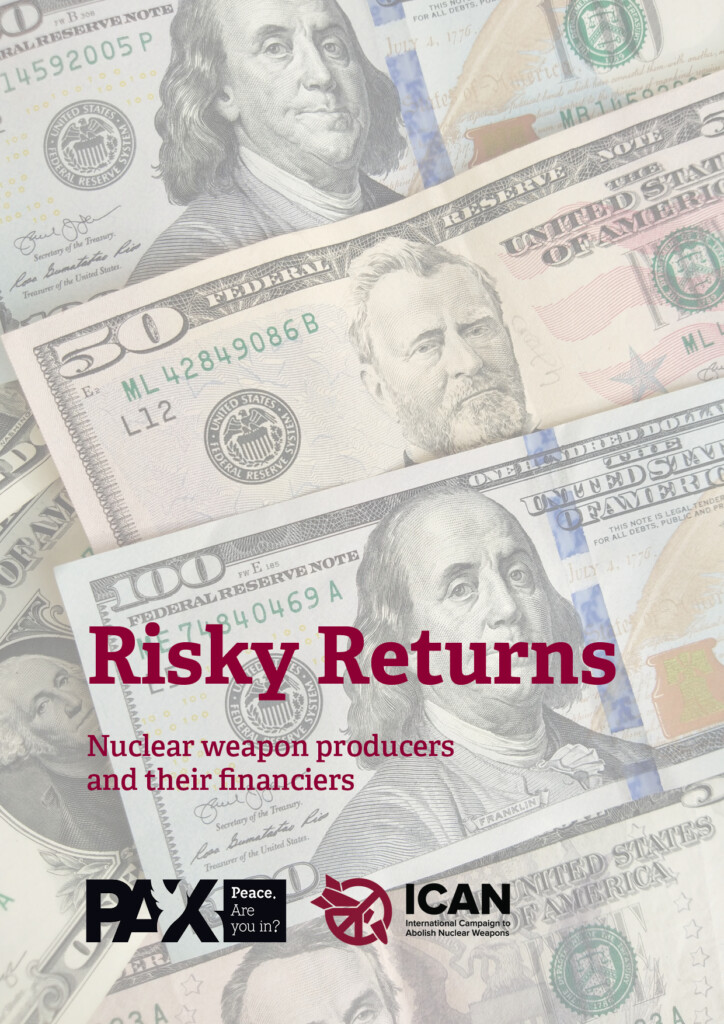The 2022 report “Risky Returns: Nuclear weapon producer and their financiers” is a joint publication of ICAN and PAX. The report details how 306 financial institutions made over $746 billion available to 24 companies heavily involved in the production of nuclear weapons, between January 2020 and July 2022. These companies contribute to the nuclear arsenals of China, France, India, the Russian Federation, the United Kingdom and the United States.
As shown in the report, fewer long-term investments were made in the companies behind the nuclear weapon industry. The data shows a $45.9 billion drop in loans and underwriting. This could signal that a growing number of long-term investors does not see nuclear weapon production as a sustainable growth market and regards companies involved in it as a risk to be avoided.
The report also examined companies involved in producing, manufacturing, or developing nuclear weapons for six of the nine nuclear armed countries for which data was available. These 24 companies are involved in activities that are outlawed under the Treaty on the Prohibition of Nuclear Weapons (TPNW), which entered into force in 2021. More than $280 billion in contracts for such activities were identified, though the true number is likely much higher since many companies do not publish contract details. The biggest nuclear weapon profiteer remains Northrop Grumman, with at least $24.3 billion in outstanding contracts, not including the consortium and joint venture revenues. Aerojet Rocketdyne, BAE Systems, Boeing, Lockheed Martin and Raytheon Technologies also hold multi-billion-dollar contracts for nuclear weapon production and/or stockpiling.
Investors made over $746 billion available to the nuclear weapon producing companies, a $61.5 billion increase from the 2021 “Perilous Profiteering’’ report. This can be attributed to an increase in the total value of shares, which grew by $108.5 billion. Many nuclear weapon producers also produce conventional weapons and saw their stock values rise in 2022, likely resulting from the announcement by NATO states that they would significantly increase defense spending following Russia’s invasion in Ukraine.
Financial sector leverage
Financial institutions that back nuclear weapon producing companies enable them to continue their involvement in the development and production of these weapons of mass destruction. They therefore have an important role to play in joint efforts to reduce the role of nuclear weapons in society.
When an investor chooses to end its relationship with a company because of the latter’s involvement in the production of nuclear weapons, it sends a clear signal to the world that weapons of mass destruction are never acceptable.
The role of financial institutions in furthering efforts to reduce the role of nuclear weapons in society was exemplified by the engagement of the sector in the first Meeting of States Parties to the TPNW in June 2022. At that meeting, Italian asset manager Etica Funds delivered a joint statement on behalf of a group of 37 investors, that called upon states to apply the prohibition on assistance to prohibited acts under the Treaty to all forms of financial assistance, including those made by the private sector operating within their jurisdiction. As put forward in the statement, ‘‘[i]t would be illogical to prohibit the production of nuclear weapons without prohibiting the financing that enables the production to proceed’’
The financial sector has an opportunity to build on and reinforce the international norm against nuclear weapons, cemented by the entering into force of the TPNW in January 2021. Through divestment, nuclear weapon producers can be pressured to cut the production of these weapons of mass destruction from their business strategies and, in turn, will make it more difficult for nuclear armed states to maintain their arsenals.
15 December 2022

